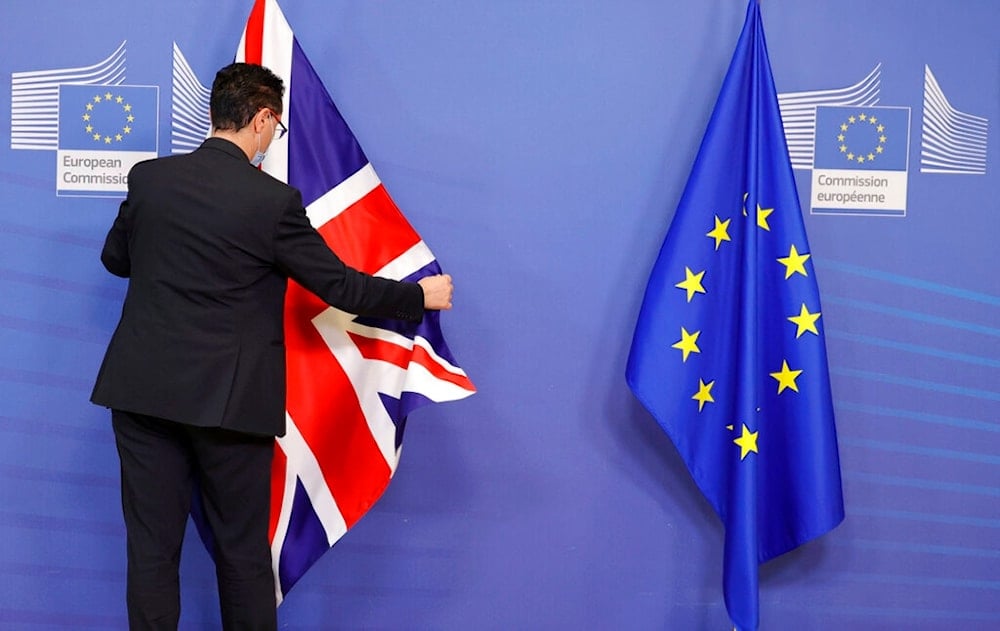UK rejects EU's €6.75bn fee to join security fund: Bloomberg
The UK has refused the European Commission's request for up to €6.75bn to join the EU's new defense fund, creating fresh tensions in post-Brexit relations.
-

A member of protocol adjusts the EU and Union flag before an official greeting between European Commissioner for Inter-institutional Relations and Foresight Maros Sefcovic and British Foreign Secretary Liz Truss at EU headquarters in Brussels, on February 21, 2022. (AP)
Bloomberg on Tuesday reported that talks between London and Brussels over Britain’s entry into the European Union’s flagship security financing program have hit a wall, after the UK rejected a multi-billion-euro fee proposed by the European Commission.
The standoff introduces fresh strain into post-Brexit relations under Prime Minister Keir Starmer and could complicate Europe’s broader push to strengthen its military posture against Russia.
According to officials familiar with the discussions, the Commission asked the UK to contribute between €4 billion and €6.5 billion to join the Security Action for Europe initiative, known as SAFE, and added an administration charge ranging from €150 million to €250 million. Those involved in the negotiations said London dismissed the offer as disproportionate and far beyond what it had anticipated paying.
In a brief statement, the British government responded that "We will only agree deals that provide value to the UK and UK industry. Nothing has been agreed, and we will not give a running commentary on ongoing talks."
Security rift
The SAFE program is designed to mobilize up to €150 billion through EU borrowing to accelerate production of essential military capabilities, from drones and missile systems to cybersecurity tools and a future European air shield.
While the initiative primarily focuses on EU member states, the Commission has also been in discussions with non-EU partners such as Canada, Turkey, South Korea, and the UK.
Officials say British security firms could gain significant access to contracts if the UK were to join. However, a senior British figure involved in the talks described the Commission’s request as far beyond reasonable expectations, confirming that London had rejected the proposed terms. They pointed to France as the most “hard-line” actor in pushing for a higher contribution and indicated that attempts to reduce the figure would continue.
Continental Split
Some European capitals, sources said, view the Commission’s proposal as overly rigid and are urging a more flexible fee to keep the UK engaged, while others want strict adherence to the rules governing access for non-EU states. That said, the internal divergence has added another layer of complexity to the negotiations.
One person familiar with the UK’s position warned that shutting Britain out of the program would weaken Europe’s joint rearmament efforts and risk sending Russian President Vladimir Putin the impression that the continent lacked seriousness in confronting security threats.
The clock is ticking for an agreement: EU member states must submit their project proposals for SAFE financing before November 30, leaving limited time to bridge the gap between the two sides.
As Europe seeks to adapt to a shifting geopolitical landscape, the outcome of these talks will help determine how closely Britain is woven into the continent’s emerging security architecture.
Read more: EU moves to build new intelligence unit under von der Leyen leadership

 3 Min Read
3 Min Read








